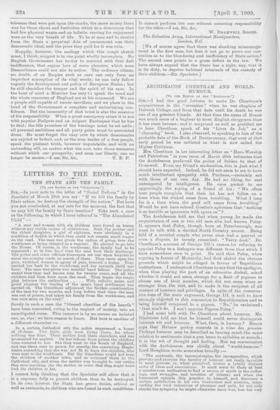LETTERS TO THE EDITOR.
THE STATE AND THE FAMILY.
(To Tux EDITOR Or THE "SPECTATOR.1
SIR,—In your note to the letter of "Social Reform" in the Spectator of March 20th you say : "If we kill the family by State action, we destroy the strength of the nation." But have you not overlooked, at any rate for the moment, the fact that we may kill the family by State inaction? Take such a case as the following, to which I have referred in "The Abandoned
Child" :—
, "A man and woman with six children were found on tramp without any visible 11108,119 of subsistence. Both the mother and the olden daughter, a girl of eighteen, were obviously in a condition of health in which they could not remain much longer on the road. The man was given the option of going into the workhouse or being charged as a vagrant. He elected to go into the House. Of course, in the workhouse, the family had to be separated; so itr two days' time the man took their discharge. The police and other officials thereupon set out upon bicycles to scour the country roads in search of them. They came upon the poor, wretched woman in agony of pain, beneath a hedge. They carried her back to the workhouse, and her seventh child was born. The man was given two months' hard labour. The police stated that they had known him for twenty years, and all the children had been born upon the road. Then began the tragic
play between the authorities With infinite pains and great expense the tracing of the man's legal settlement was carried on. The Guardians adjourned the further consideration of the case for two months, and long before that time the man was out of prison, had taken his family from the workhouse, and was once more on the road."
Surely in such a case the "blessed charities of the hearth" have been converted, owing to the neglect of society, into an unmitigated curse. This instance is by no means an isolated one, as, alas! we have reason to know. But here is another of a different character :-
In a certain Cathedral city the pollee suppressed a house of ill-fame. Two little girls were living there, for whom nothing was done. Their mother took them elsewhere, and was prokecuted for neglect. On her release from prison the children were restored to her. She then went to the South of England, and was there sent to prison for cruelty, the convicting Magis-, trates remarking that she was not fit to have the children, who were sent to the workhouse. But the Guardians would not keep the children of another town, and so returned them to the Cathedral city, and when the matter was brought to our notice they were searching for the mother in order that thev might hand Lack the children to her.
I cannot help thinking that the Spectator will allow that it is a supreme folly to permit children thus to be destroyed. In its own interest the State has grave duties, ethical as well as economic, to children who are found in such conditions.
It cannot perform the one without assuming responsibility for the other.—I am, Sir, &c.,
W. BRAHwELL BOOTH.
The Salvation Army, International Headquarters, London, E.C.
[We of course agree that there was shocking mismanage- ment in the first case, but does it not go to prove our con- tention as to the blundering and inefficiency of State action P The second case points to a gross defect in the law. We have always argued that the State has a right, nay, that it is its duty, to deprive habitual criminals of the custody of their child ren.—En. Spectator.]










































 Previous page
Previous page